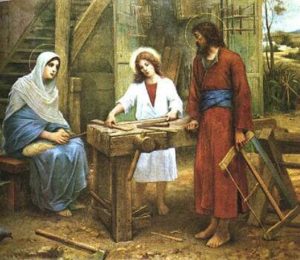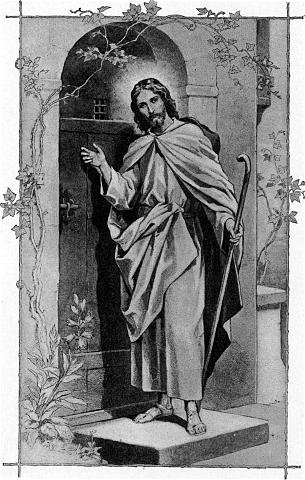Hardly the Hired Help
There can be no greater trial for a conscientious man than to think that he is unable to support his wife and family, and that he has lost their confidence to do so.
Every job has its stresses, and being able to maintain a job is usually at the top of the list. Most people who can work actually wish to work, as there is something woven into our nature about being productive. This is evident from Genesis; while work took on some penal quality following the first sin (cf. Gen. 3:17 ff), before that Adam and Eve were given to tend the Garden of Eden (cf. Gen 1:28).

Work adds a dignity to a person, especially if it is personally fulfilling or for a worthy and necessary cause.
After the death of St. Joseph, Christ would have had to take his place in maintaining the house and home for our Lady. We do not know when St. Joseph died, but it would likely have been some years before our Lord began His public ministry. Christ would have learned the carpentry trade well; He was known as the son of the carpenter (cf. Mk. 6:3), so likely there was a comparable quality in the workmanship.

In spite of that, it can be reasonable to speculate that work was not always readily available in Nazareth, and so our Lord would have to go and hire Himself out at times. Perhaps He would take His place among the other men at the marketplace and wait, like the one he describes in a parable, so He would have actual experience with such settings.
Whatever the case may be, if and when He was hired, the personality of his hirer could be a mixed bag. The hirer could be demanding, grumpy, never pleased with anything, or perhaps kind and generous. Either way, our Lord would humbly subject Himself and complete the work agreed upon, perhaps having to make adjustments to His already flawless creation to accommodate the changing tastes of His employer for the day.
To think of Christ doing this regularly is something that likely has not crossed our minds much, if at all, and it certainly leaves a lot to consider. Remember that He spent most of His life in obscurity because that is how most of us will live, work, and sanctify ourselves, and He wanted to set the example that sanctity is achieved through the ordinary. He took on the daily difficulties we all face and would not exempt Himself from them, even though a quick use of divine power could have more than satisfied any want for Him, Mary, or those in the town.
But we must ponder for a moment that Jesus Christ, God Himself, after completing His work, would then have to extend His hand for payment. He would go about looking for hire in exchange for a wage, no different from any other man around Him suffering the same plight. He required a wage so as to secure a livelihood.
 This did not stop when Christ left His Nazarene home to begin His public life and the proximate work of our redemption. While our Lord would lay aside His carpentry tools, He would pick them up again, so to speak, after His Ascension. That is because He wanders now, knocking on the doors of our souls looking for work – most necessary work – wanting to enter and give them the makeover they need by His grace and presence (cf. Apoc. 3:20). Again, He encounters the same mixed bag of personalities as He did long ago: some grumpy, obstinate, never pleased with anything, others more charitable, agreeable, and generous.
This did not stop when Christ left His Nazarene home to begin His public life and the proximate work of our redemption. While our Lord would lay aside His carpentry tools, He would pick them up again, so to speak, after His Ascension. That is because He wanders now, knocking on the doors of our souls looking for work – most necessary work – wanting to enter and give them the makeover they need by His grace and presence (cf. Apoc. 3:20). Again, He encounters the same mixed bag of personalities as He did long ago: some grumpy, obstinate, never pleased with anything, others more charitable, agreeable, and generous.
It does not matter to Him.
He knocks looking for hire. He knows well our preferences and accommodates them where it is beneficial, but strives to convince us His designs are best when things are not turning out as we expected. Shaping His Cross in our hearts takes time and patience after all.
He then holds out His pierced hand for a daily wage – our love and fidelity and commitment to Him, with the expectation that He can return tomorrow to continue His work and not need to wait at the marketplace.
February 8, 2021








